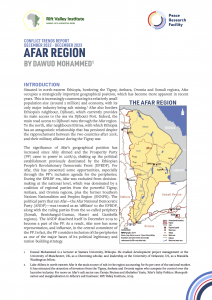INTRODUCTION
Situated in north-eastern Ethiopia, bordering the Tigray, Amhara, Oromia and Somali regions, Afar occupies a strategically important geographical position, which has become more apparent in recent years. This is increasingly counteracting its relatively small population size (around 2 million) and economy, with its only major industry being salt mining.2 Afar also borders Ethiopia’s neighbour, Djibouti, which currently provides its main access to the sea via Djibouti Port. Indeed, the main road access to Djibouti runs through the Afar region. To the north, Afar neighbours Eritrea, with which Ethiopia has an antagonistic relationship that has persisted despite the rapprochement between the two countries after 2018, and their military alliance during the Tigray war.
The significance of Afar’s geographical position has increased since Abiy Ahmed and the Prosperity Party (PP) came to power in 2018/19, shaking up the political establishment previously dominated by the Ethiopian People’s Revolutionary Democratic Front (EPRDF). For Afar, this has presented some opportunities, especially through the PP’s inclusion agenda for the peripheries. During the EPRDF era, Afar was excluded from decisionmaking at the national level, which was dominated by a coalition of regional parties from the powerful Tigray, Amhara, and Oromia regions, plus the former Southern Nations Nationalities and Peoples Region (SNNPR). The political party that ran Afar—the Afar National Democratic Party (ANDP)—was treated as an ‘affiliate’ to the EPRDF, along with the ruling parties from the so-called periphery (Somali, Benishangul-Gumuz, Harari and Gambella regions). The ANDP dissolved itself in December 2019 to become a part of the PP. As a result, Afar now has some representation, and influence, in the central committee of the PP. In fact, the PP considers inclusion of the peripheries as one of the major bases of its political legitimacy and nation-building strategy.



